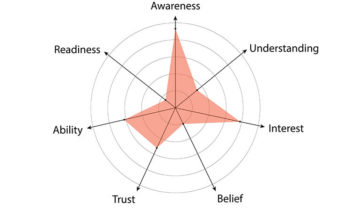What They Don’t Teach You in B-School
The Rise of Intellectualism
In his most recent book, Skin in the Game, Nassim Taleb defines intellectualism as, “the belief that one can separate…theory from practice.” The problem with intellectualism, according to Taleb, is that it obscures the causal links between thoughts, actions, and consequences. Theories not subject to the balancing feedback of consequences are dangerous to one’s commercial health.
Nevertheless, beginning early in the 20th century, businesses schools embraced intellectualism and scientism, which Taleb defines as, “a naive interpretation of science as complication rather than science as a process and a skeptical enterprise. Using mathematics when it’s not needed is not science but scientism.” As Tom McMakin and Doug Fletcher note in How Clients Buy:
Like other social sciences, including sociology, anthropology, and psychology, the study of business suffered from an inferiority complex as newcomers in the academic ranks. Business departments made up for it by emulating the hard sciences like mathematics and physics, teaching economics, finance, the management of resources—anything that could be quantified—while eschewing soft skills like people management or sales, which might be better learned standing at the side of an experienced practitioner.
As a consequence, “intellectual” marketing pushed aside “commercial” sales as a featured topic of discussion within the academy.
The Perception of Sales as Being Grubby
The omission of sales from the curricula of academic training need not be a constraint. If it’s truly important, we would expect firms to make an investment in developing the sales skills of its employees and partners. We don’t, though. More often than not, junior partners are left to their own devices.
While selling is acknowledged as being necessary to a firm’s survival and success—and “rainmakers” rewarded handsomely—the act of selling is commonly perceived as being grubby or déclassé. It’s not something done in polite society.
Part of that perception is due to our self-awareness that professional services are a credence good. Per Wikipedia,
A credence good is a good whose utility impact is difficult or impossible for a consumer to ascertain…The seller of the good knows the utility of the good, creating a situation of asymmetric information.
Asymmetric information gives rise to the agency problem, in which the seller of a service can be tempted to exploit the buyer. Professional ethics and misunderstanding of what selling entails result in a misperception of sales as being inherently manipulative and, in the long run, potentially damaging to our reputations.
Even while acknowledging the requirement for sales, we cringe at the thought of being labeled a salesperson. Too often, that aversion stunts our professional growth and ability to make a living.
Misguided Essentialist Philosophy
Plato and Aristotle cast long shadows. Essentialism as applied to sales—the persistently popular view that salespeople have intrinsically different and characteristic natures or dispositions—is a perspective that diverts our attention from what is actionable. That is, it focuses on the seller and ignores the buyer. That’s a mistake.
The American Bar Association reports that there has been an 18% increase in the number of lawyers in the United States over the last 10 years. That’s somewhere between 2-3 times the rate of growth of the country’s population. The competition among providers of professional services continues to heat up. Relative market power is shifting to buyers.
Focus on Clients
Business development is a practical requirement. It’s worthy of our study and understanding—notwithstanding the neglect of sales by schools. Furthermore, a seller-centric perspective that emphasizes persuasion and manipulation are short-sighted, outdated, and ineffective. Bullshit and exploitation aren’t sustainable in a competitive environment predicated on trust.
Tom and Doug offer an alternative path, one characterized by the following:
- An empathic view the client’s buying process
- The demonstration of trustworthiness and competence, and
- The cultivation of meaningful relationships over time
A focus on how clients buy reconnects theory and practice. It acknowledges the reality of the marketplace. It allows us to be more effective salespeople without compromise.




